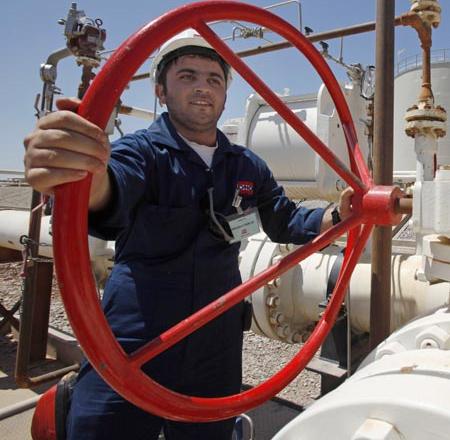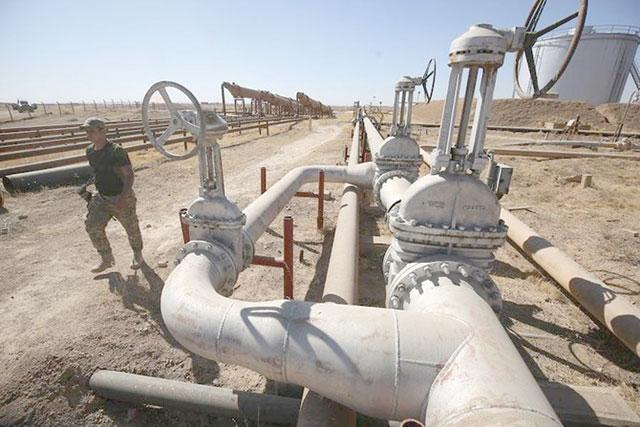You are here
Fuel shortages in Iraqi Kurdistan to last at least another week
By Reuters - Jun 22,2014 - Last updated at Jun 22,2014
ERBIL — Fuel shortages in Iraq’s autonomous Kurdistan region will last for at least another week, government officials said on Sunday, as sweeping advances by Sunni Muslim militants further south put a heavy strain on supply lines.
Queues of motorists, some up to 2km long, have been one of the most visible signs of the militants’ battlefield successes in Iraq for the people of Kurdistan’s regional capital Erbil, a city filled with new office blocks and Western oil workers barely an hour’s drive from Mosul, now in rebel hands.
The fuel shortages have exacerbated pressure on an economy already strained by central government budget cuts and virtual civil war on Iraqi Kurdistan’s southern border.
An influx of displaced families, an attack by the militants of the Islamic State of Syria and the Levant (ISIL) on Iraq’s largest refinery and fuel smuggling into insurgent-controlled towns have all hit supplies, though government officials say the situation is slowly easing.
“We are not dependent on Iraq for our fuel, we have our own refineries,” one regional government (KRG) official said.
“We expect fuel supplies to be better in the coming weeks. Already the lines are going down,” he said, adding a coupon system would be introduced soon to help ration supplies.
Motorists have already been limited to just 30 litres of gasoline or diesel every second day, with fuel supplies prioritised for ambulances and the KRG’s ‘Peshmerga’ soldiers as they fight a series of border skirmishes with ISIL-led groups.
‘We need to drive’
While heavily subsidised fuel prices have largely remained steady, many taxi drivers are increasing fares due to the time spent waiting to fill their cars. Motorists in Erbil on Sunday said the average line was around three hours long.
“You can’t work for long without petrol, we need to drive,” said Mirin Ahmed, a civil engineer sitting in a queue in his Toyota Land Cruiser at a filling station just outside the city’s Christian sector on Sunday.
While fuel shortages are relatively common in other parts of Iraq following years of violence and under-investment, the Kurdish region has in recent years presented itself as a stable environment for Western firms to do business.
Energy companies such as Gulf Keystone Petroleum and Genel Energy have been some of the biggest investors in the region, hoping to drill what is seen as one of the biggest potential onshore deposits that is still relatively untapped.
“One of the key selling points of the Kurdish region is things are meant to work,” one KRG official said this week. “We need to get this resolved as soon as we possibly can.”
The autonomous region refined about 96,000 barrels per day last year, according to a KRG presentation in London on June 17, while fuel demand is estimated at around 140,000bpd. Turkey has said it will try to increase exports to the region.
The 300,000bpd Baiji refinery near Mosul, which has been defended by Iraqi government forces in a near week-long siege against ISIL-led Sunni militants, has stopped production, straining fuel supplies throughout Iraq.
When Iraqi soldiers retreated from the north of the country after the fall of Mosul 12 days ago, the KRG was able to expand the territory it controls, including the long-disputed oil town of Kirkuk that Kurds consider their historical capital.
However, the KRG’s budget has been hit by a dispute with Iraq over oil sales. KRG officials have accused Baghdad of prioritising fuel supplies to other areas of the country.
The first cargo of Kurdish crude carried to the Turkish port of Ceyhan through a new pipeline was delivered by tanker into Israel on Friday, potentially securing the KRG much-needed revenues. Baghdad has threatened legal action against any buyers, however, decrying any sales outside its control.
Related Articles
Iraq’s autonomous Kurdish region has hit back at Baghdad over independent oil exports, a letter from the Kurdistan Regional Government (KRG) showed, threatening to counter sue the central government for trying to block its sales.
Iraq’s bid to thwart exports of oil from Kurdistan via Turkey by filing for international arbitration is a “hollow threat” that will fail, the autonomous region said on Sunday.
BAGHDAD — Iraq's federal authorities and the cash-strapped Kurdish regional government (KRG) have relaunched talks over longstanding oil and













